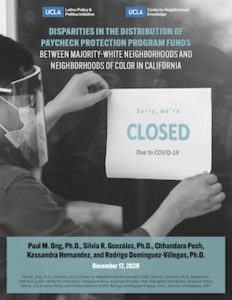 A new study published by the Latino Policy and Politics Initiative and the Center for Neighborhood Knowledge at the University of California, Los Angeles, found that neighborhoods in California whose populations are majority Black, Latino or Asian benefitted less than White neighborhoods from the $500 billion in forgivable loans distributed nationwide through the Paycheck Protection Program amid the pandemic.
A new study published by the Latino Policy and Politics Initiative and the Center for Neighborhood Knowledge at the University of California, Los Angeles, found that neighborhoods in California whose populations are majority Black, Latino or Asian benefitted less than White neighborhoods from the $500 billion in forgivable loans distributed nationwide through the Paycheck Protection Program amid the pandemic.
The report found that stimulus funds helped majority-white neighborhoods retain 51 percent of their pre-pandemic jobs, compared to 44 percent in majority-Latino neighborhoods and 45 percent in majority-Asian neighborhoods. And although the program helped retain 54 percent of pre-pandemic jobs in Black neighborhoods, that figure is somewhat misleading because those neighborhoods typically had a smaller job base to begin with. When standardized on a per-resident basis, the federal loans supported 5.8 jobs per 100 residents in Black neighborhoods, compared with 8.1 per 100 residents in White communities.
The authors also found that Latino and Black neighborhoods received less funding per capita than White neighborhoods:
-
- Asian neighborhoods received $670 per resident
- White neighborhoods: $666 per resident
- Black neighborhoods: $445 per resident
- Latino neighborhoods: $367 per resident
“Communities are being unfairly left behind at a time when the pandemic has revealed serious inequalities that need to be urgently tackled,” said Rodrigo Domínguez-Villegas, director of research at the Latino Policy and Politics Initiative and a co-author of the report. “Federal policy should not contribute to worsening income inequality, and future stimulus efforts must fix the inequities created by the pandemic and the uneven access to loans.”











